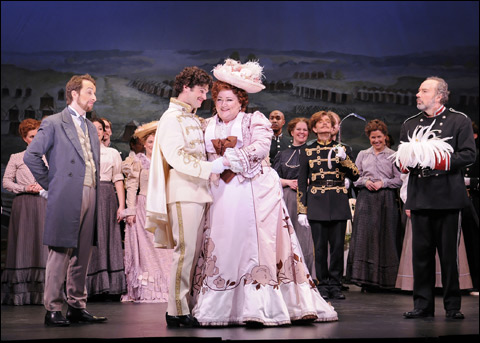
COMMANDING PRESENCE In the title role of La Grande-Duchesse de Gérolstein, Stephanie Blythe was irresistible on every level. |
Leaving the Cutler Majestic after the opening night of Opera Boston’s latest Offenbach, La Grande-Duchesse de Gérolstein, you could see the smiling faces of an audience that had had a good time. Offenbach’s witty and charming military satire (which includes a war for which nobody understands the motive) has some of his most appealing and amusing numbers (including a parody of Meyerbeer), and its leading lady — Met diva Stephanie Blythe (in her Boston stage debut), who’s part Mae West and part kewpie doll — had just given a performance so complete, so vocally thrilling, so irresistible on every level . . . well, what’s the last time that happened here?
Offenbach’s Grand Duchess is the sex-starved ruler of her Second Empire–like Ruritania. She’ll stop at almost nothing to get one of her privates into the sack. Unfortunately, airhead Fritz is betrothed to Wanda (a Village Maiden), and he’s not about to give her up, not even when the Duchess promotes him to general over the blustery protestations of General Boum — who then enters a conspiracy to off the private. So much for plot. But Blythe fleshed out every charming ounce of character, from one hit number (“Ah! que j’aime les militaires,” the Duchess’s peppy paean to her troops) to another (“Voici le sabre” — presenting her father’s sword to the new general, she got the whole audience to sing and clap along) to still another (the sly “Dites lui,” her confession to Fritz that she knows “someone” who’ll give him anything). One of stage director David Kneuss’s funniest bits was having Blythe’s climactic high note knock all the ladies-in-waiting flat on their bustles. (I knew just how they felt.) But Blythe’s voice isn’t just big, it’s also richly plush, and she can scale it back to the softest pianissimo. And though she is a big lady, she knows how to move — every wriggle of her shoulder or hip, curl of lip or eyebrow, or crinkle of nose told us exactly what the Duchess was thinking and feeling. A total performance!
She got sophisticated back-up from baritone James Maddalena (John Adams’s original Nixon) as General Boum, licking his palm and smoothing it over his plume, or straddling his well-endowed cannon and singing, “Pif! Paf! Pouf!”; from tenor Frank Kelley as the GD’s factotum, a hilarious graduate of Monty Python’s Ministry of Silly Walks; and from elegant baritone David Kravitz. And comic if less sophisticated support from Scott Ramsay (Fritz), Wendy Bryn Harmer (Wanda), Torrance Blaisdell (Baron Puck), and Lee Gregory (the Duchess’s preening fiancé). Word slipped out that David Smith Larsen, the non-singing majordomo, is Blythe’s real-life husband.
Robert Perdziola’s drops and backdrops (which included a copy of Polish artist January Suchodolski’s Siege of Ochakiv) and spectacular costumes for Blythe (frou-frou gowns and a gleaming scarlet and brass military outfit) caught Offenbach’s drollery. Kneuss’s staging was professional (he “semi-staged” the BSO’s operas under Seiji Ozawa) and amusing, aimed more at jokes than at character, and playing down Offenbach’s tender side. (In “Dites lui,” for example, he let the poignant moment when the Duchess suddenly makes it clear that she’s singing about herself go virtually unnoticed.) Conductor Gil Rose led with energy and panache, but on classic Offenbach recordings, you can also hear a dynamic and rhythmic flexibility that gives the music the intimacy of speech. Opening night, a couple of extended set/costume changes near the end of an already long evening caused the breezy pace to grind to a halt. These aren’t minor reservations, but with Blythe at the center, at her astonishing best, this was the finest show I’ve seen in some time. Think of all those smiles!